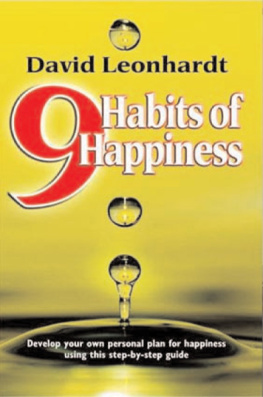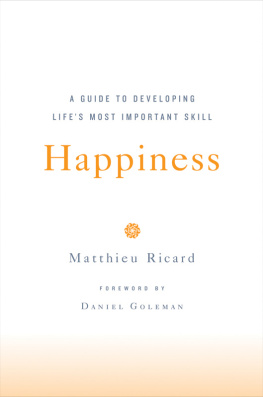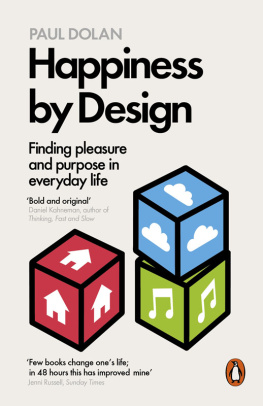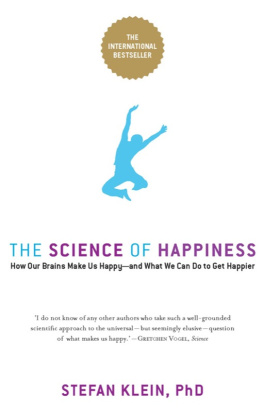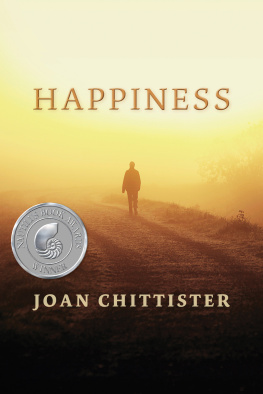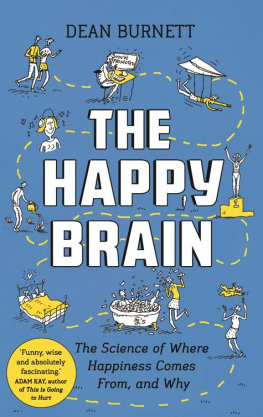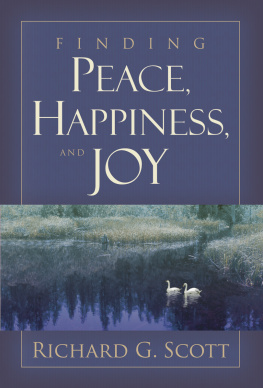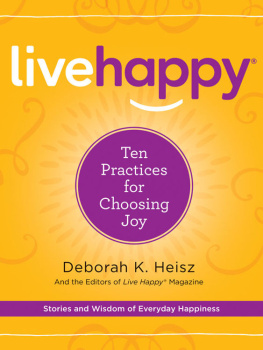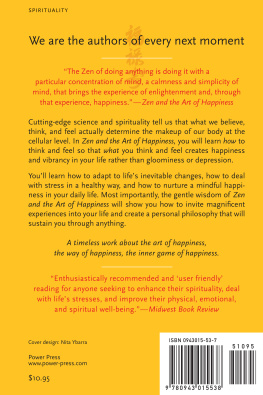How can a book about happiness begin with a story about grief? The inspiration for this book came while I was lying face down on a massage table, being gently pummelled by a masseuse in Sabah in Borneo, part of Malaysia. This is not my usual place of inspiration. I tend to have my best thoughts while waiting in line at the supermarket checkout. My sons and I were holidaying in Borneo with my sister, Cynthia, her husband and their three young children. The reason to help us all to come to terms with my mothers recent death from cancer.
Suffice to say, Cynthia and I had only ever had one parent a loving, fabulous and dynamic mother. And now she was gone. And I dont think either of us was coping particularly well. My sister had been throwing herself into work, which is easy to do when you are an international banker in Hong Kong. But my job involves interviewing doctors, patients, visiting hospitals and often talking about illnesses such as cancer. And a contract to write a book on breast cancer had been gathering dust on my desk for some time. Lets just say it wasnt the best way to move forwards, to be reminded every day how our mother had died. The trip seemed the ideal solution. While I was being gently pounded by a Malaysian masseuse, I thought of a way of addressing two big problems in my life. I needed to find a way of restoring my own equilibrium and happiness, which had taken a major battering, and I needed to produce a book. My publisher had been dropping subtle hints about a happiness book, and finally I had the time and space to really think it through. Why not investigate the pathways to happiness from a number of different perspectives? Lets face it, if you can be happy in the midst of grief, if you can find some elements of sunshine when all else around you is darkness, then the techniques must really work. And if it would work for me, then hopefully it would work for others, too. I got up from the massage table with a renewed sense of purpose and focus. Straight away, I began to flesh out the ideas.
I decided to divide my journey to happiness into six parts. I would examine six strategies that happiness academics and health experts say can make you happy, then I would roadtest each one while I was living a normal life (and no, lounging by the pool at a resort in Borneo is not a normal life, not for me anyway). Instead, my life consists of my partner, Phil, a full-time job, two children, two stepchildren, an ex-husband, assorted pets, friends, extended family, charity work, exercise and, yes, occasionally writing. And, however appealing, taking a year off work and family to find myself and to find happiness wasnt feasible for me (or most people, I suspect).
I had several goals. I wanted to find out What is happiness? To start a journey, you need to know your destination. (If you dont know where you are going, it will be a very long journey.) To learn how to be happy, you need to know what happiness is.
I wanted to focus on things I could change. Happiness is linked to economic status and financial security as well as whether you are married or not, but these are factors that you cant change, well not quickly anyway.
And I wanted to know whether happiness matters or not. Plenty of people go through life without really feeling that deep sense of wellbeing and contentment, so I wanted to find out whether happiness was genuinely important in life. The Swiss psychiatrist and founder of analytical psychology Carl Jung spoke about the relationship between happiness and sadness. He pointed out that there are as many nights as days, and the one is just as long as the other in the years course. Jung said that even a happy life cannot be without a measure of darkness, and the word happy would lose its meaning if it were not balanced by sadness.
I felt that how I was feeling would put me in an ideal position to look into what makes us all happy. I could test whether what happiness experts recommend actually makes a difference. While it is easier to focus on happiness when everything in your life is going well, I wanted to find out if the same advice would work when things werent going as well as they could be. I wanted to find out how to be happy when your life was not perfect.
I felt at such a low point in my life that I had nothing to lose by focusing on happiness. And given how I was feeling, I was sure I would notice even subtle changes to my mood. On many other levels, I could still function well. At work, I could still sift through complex scientific papers to find a good story. Despite my grief, I felt I could still trust myself to sort out what might be useful or not in a journey to happiness. Even though my emotions were shrouded in sadness, I believed I could be a guide to help myself and others to feel happier. I had little to lose by making my life happier and I knew that I had much to gain.
I certainly never thought I would write a book about making a journey from sadness to happiness. I wanted to share my story in the hope that others could view my experiences and emotions and think, yes, that is exactly how I felt. I knew that happiness is personal and that to really investigate happiness, I had to look at what would make me happy, as well as what might have worked for other people. Throughout the book, my story will be told in the sections called My journey.
Ive always thought of myself as a happy person. Before I lost Mum, the lowest points in my life had been when my marriage broke up and when my beautiful grandmother died. But my mother and grandmother brought me and my sister up to be resilient and strong when things go wrong, and to seek strength within when things get tough. I was saddened and emotionally bruised by my divorce and losing my grandmother. But after giving myself the time and space to feel sad for what I had lost, I had the inner strength and resilience to cope with what had happened.
My mother was a single mother in Australia in the late 1960s and 70s. Back then, it was a rarity. It was the era when banks wouldnt lend money to single women to buy a house as it was considered too risky an investment. I remember noting that my sister and I were the only children of divorced parents at the little local Catholic primary school we attended. Nevertheless, I wasnt embarrassed or proud it was just the way things were.
I think because my mum was single, my sister and I were much closer to her than a normal nuclear family. We had a very strong bond, perhaps because we relied on each other so much. Although we didnt always agree on everything, we never yelled at each other or treated each other badly.
My grandmother was my mothers best friend, and my sister and I ran a close equal second. My family is a unique mix of restraint and exuberance: restraint in language, physical affection and speech but exuberance in every other way, in their love of good food, wine, cooking, entertaining and being the life of the party. My mother lived an extravagant life and was definitely a do as I say, not as I do kind of parent. She would organise lunches for our extended family at the drop of a hat or three-course dinner parties where everyone came in black tie. She was the centre of our family and was never happier than when she was entertaining her large group of family and friends. One of her favourite things to do was to get dressed up and go out dancing with one of her best friends, David.
The diagnosis of cancer just days before Mums sixtieth birthday was a shock. We had planned a huge party to celebrate her sixtieth. When we were told she had to have major surgery straight away, we all took a deep breath. The party went ahead and I finally understood the meaning of the word bittersweet'. It seems a million years ago, but we rallied and drank and danced and celebrated the milestone of Mum reaching sixty, laughing and crying.


